Book People’s Wisdom in Kurdish Language
480,000 تومان
Subject: Sociology
Author: Professor Fariborz Hamzeh’ee
Publisher: Razi University
ISBN: 978-3600-393-070-4
Number of pages: 527
Edition: first
Publication date: 2023
From Under-development to Sustainable Development Vol. 5: People’s Wisdomin Kurdish Language. A collection and cultural analysis of Kurdish proverbs by: Fariborz Hamzeh’ee
From Under-development to Sustainable Development
Vol. 5:
People’s Wisdom
in
Kurdish Language
A collection and cultural analysis of Kurdish sayings and proverbs
Fariborz Hamzeh’ee
(PhD, Dr. phil, PD, Dr.habil.)
Razi University Press
Kermanshah
2023
People’s Wisdomin Kurdish Language
Most of the written history of the world is that of the powerfuls and those related to them. This version of history has been the main source for the modern people to mould their world views. They have been looking at themselves and their world from the same historical prospective in order to shape their own future. In the same manner this history has been influencing the modern world to adopt the culture and social values of a small minority of aggressive invadors or rulling classes.
Similarly this type of history has hat a widespread influence on how modern people have been thinking and acting in the world. But the history of the invading or certain dominant groups of men can not be regarded as the only history of humankind as a whole. The story of the majority of people living on the earth in different places and periods, in larger or smaller groups has remaind at large in darkness. A large part of the ideas and concepts about how the rest of the humankind lived, has been rather imaginary versions; which were inspired from the prospective of the above mentioned written history of certain powerful groups in the past.
The most important factor or at least one of the main reasons for the above mentioned history to become the history of the world, was the foundation of capitalist educational system.
One of the tragic deculturating consequences of the penetration of capitalist was undermining real understanding of the life and destiny of the majority of people of different periods and places in the past. This was the result of an illusion that the written sources were enough to understand the past.
A collection and cultural analysis of Kurdish proverbs
But the largest part of human culture had been transferred orally rather than written. Therefore, as a matter of fact, oral traditons of different kinds were valuable sources for understanding of material and non-material cultures of the larger parts of the world population in different generations.
But now that capitalist culture has reached the hight of endangering the life of our planet, it has become vital that the concept of capitalist history would be corrected and revised at least for sake of the future. It is finally the time that the neglected history and culture of the majority of people be known; at least the culture makers, whose main concerns were not wars, domination and cxploitation of others. The heroes of most of these people were not the thoughtless Rambo killing-machines, but rather those thoughtful thinkers, mystics, Derwishes, Sadhus and the wise passifist peasants and leaders of small cultural ecosystems.
Understanding of the world of these people would have been possible through the survived oral tratitions and even indigenous knowledge of different kinds. But as oral tradition were the main form of transmiting native cultures, their destruction was one the main consequences of capitalist endavour to create cultural unification. In the process of capitalist cultural penetration, the largest parts of oral sources about native cultures have been eliminated.
It is doubtful wether the little survived oral tradtions are sufficient enough to fill the gap of our knowledge about the past. Still as long as no new methods have been found, the only possible alternative is to try to save that much of oral traditions which are available.
With the conviction that during last decades the destruction of cultural ecology has been as serious as the destruction of natural ecology, for about twenty years I have used my limited resourccs to save some remaining parts of oral tradtions of the Kurds and peoples of Zagros.
From Under-development to Sustainable Development
The seriously endangered Kurdish language is as a matter of fact, an important world’s cultural heritage. It is certainly at least one of the oldest languages of Mesopotamia. It is also still even now, one of the most spoken languages of this region. In a vast region between Meditaranian Sea and Khorasan on the east and from Caucasus to Persian Gulf on the south, different versions of Kurdish are spoken. Among these numerous versions, those known as “South Kurdish” are especially threatened.
The name “South Kurdish” has been given to two groups of Kurdish language spoken in several provinces in present day Iran and Iraq. One of these two groups is known as “Kermāshāni”, as it was the language of the city of Kermānshāh and the region west of it; including Khānaqin and Mandali in Iraq. Whereas in Iraq the name used for it is “Faili”, recently the name “Kalhori” due to the great Kalhor tribe, has been used for it by some writers.
But different versions of this group is spoken by several other tribes also in Ilām (previously Poshtkuh principality) or north east of Kermānshāh in Kolyāi or south east of present Kurdestān province of Iran as well as by other groups. On the east of Kermānshāh city also in the provinces of Lorestān and Hamadān as well as east of Ilām province (Poshtkuh), “Laki” group of South Kurdish is spoken.
One of the important aspects of South Kurdish is its close relation with Gurāni language. This is an interesting subject waiting to be thoroughly investigated in the future.
People’s Wisdomin Kurdish Language
There exist some reasons to assume that Gurāni has been used in the region prior to the emergence of Kurdish. There are numerous words and gramatical forms common between Gurāni and both of the mentioned South Kurdish groups. After all as a matter of fact, Gurāni has always been the literary language of the people of this region. As known, Gurāni has a rich and old literary tradition. As the literary language of the region, Gurāni could be understood by the speakers of both Laki and Kermāshāni groups of South Kurdish. As a matter of fact it can be supposed that generally Gurāni and South Kurdish belong to the same cultural ecosystem and therefore have the same heritage of oral traditions.
Despite the fact that two of the oldest writing systems of the ancient world have been invented in Mesopotamia by the Assyrians and Ilamites, also here the largest part of culture has been transmitted orally. Therefore Kurdish language is a heritage of special value in several cultural fields. At any case Gurāni and Kurdish have been developed in a region where several admired elite civilizations have emerged.
Although Kurdish is one of the most spoken languages of the region, much of its oral traditions has disappeared since the emergence of capitalist colonialism in that part of the world. Consequently Kurdish has become a seriously endangered language even as compared to some other languages of the region.
Anong different languages of the region, both Gurāni and South Kurdish in the last decades have gone through a very fast process of disappearance. One of the reasons for this has been the lack of any kind of official support regarding preservation of oral heritage of these language. Therefore this collection of Kurdish proverbs has been made on the basis of private resources and consequently it was facing certain limitations and shortages.
This collection of proverbs was made from among the speakers of Kermāshāni group of South Kurdish. It can at any case give an idea about the richness of oral traditions in this region. Also Laki group of South Kurdish possessed rich oral traditions.
A collection and cultural analysis of Kurdish proverbs
Proverbs could have been one of the sources which would reveal and explain much about people of the past. They contained experiences of people which in the long run could orally transfer their experiences, ideas, world views and wisdom, generally within and over generaions.
It is hoped that these large number of proverbs presented here in this volume can provide material for many cultural, social and linguistic studies in the future.
Despite of that, it is hoped that at least in the long run this collection can help the perservasion of this seriously threatened language.
Unfortunately as the language of underprivillaged people, all those families in the region which are wishing to improve their economic postion, try to distance themselves from the above mentioned underprivilleged native culture. They have already chosen to speak with their children in the dominant official languages. Moreover in this parts of the present world, we have not yet reached that point to consider diversity in cultural ecology as one of the great sources of sustainability.
With the hope that this collection can be used beyond the circle of the scholars, simple systems of transliteration have been adopted or developed; avoiding the phonetical systems used by linguists.
In this collection, each proverb has been presented in three manners. The first is the one which traditionally has been used for Gurāni poetry; but with intensive use of wovel signs. In addition to that, two other methods of transliteration with Latin and Arabic alphabets have been given. The one in Latin is a revised version of a simple system, once suggested by German Orienntal Instiute of Hamburg for Persian. Another one is separately developed with Arabic alphabets.
For this, a guide table has been presented along with some complementary explanations. In this system some signs have been suggested for the typical South Kurdish sounds.
There exist some sounds which are typital of South Kurdish such as “ö” and “ü”, somehow similar to those in German language. Even if incomplete a transcription system has been developed with Arabic-Persian alphabets, using “وو” for “u” and “ۊۊ” for “ü”or “ۊ” for ” ö”. Also strong and weak “l” are distinguished through letters: “ڵ” and “ل”, whereas “w” and “v” are written as “” و and “ﭪ” .
Be the first to review “Book People’s Wisdom in Kurdish Language”
You must be logged in to post a review.
Related products
Antholoy, Photography and Painting
Regarding the Home of the Heart; From the Premier to the Eternal Body: 4
Regarding the Home of the Heart Indigenous Knowledge and Oral Traditions of Western Iran: 34 From the Premier to the Eternal Body: 4 Regarding the Home of the Heart Painting: Lisa Wehrmann Poetry In Persian, Kurdish, German and English: Fariborz Hamzeh’ee and Persian translation of three poems by: Joachim S. Hohmann 2022 This post is [...]

 فارسی
فارسی
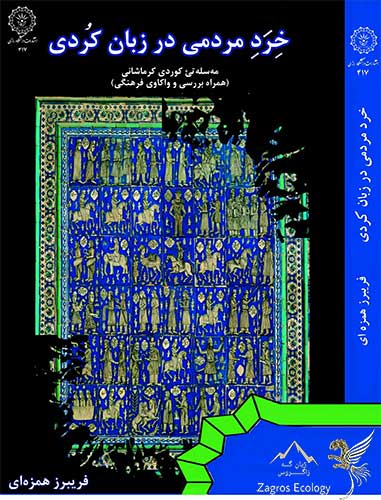
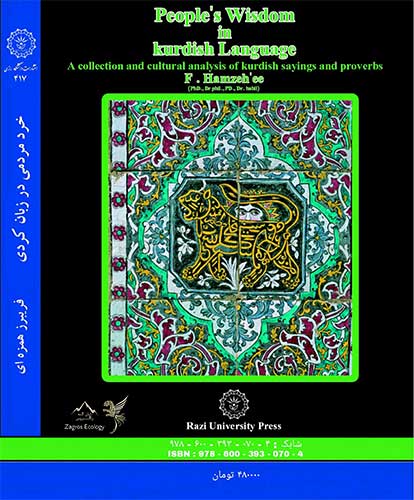
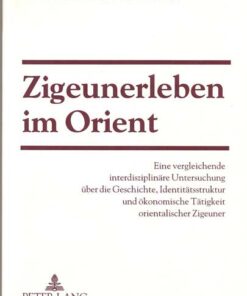
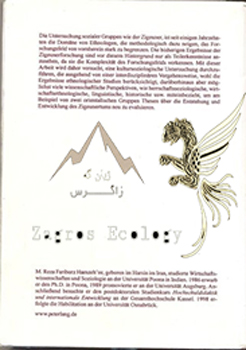
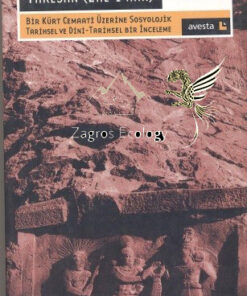

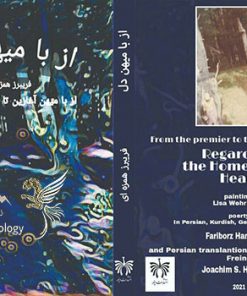
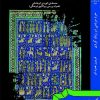
Reviews
There are no reviews yet.